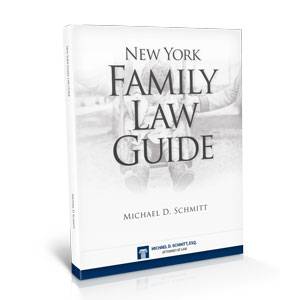If you are struggling with a legal matter in your family, you have come to the right place. The New York Family Law Guide was created by Rochester divorce attorney Michael D. Schmitt to help residents handle divorce, child custody, support, spousal maintenance and other family law matters.
 Often, people turn to their family in moments of hard times. There is a warm connotation around the meaning of family. However, sometimes coming home is harder than the difficulties in life. Home and family means something different to everyone and it’s not always a happy, harmonious setting.
Often, people turn to their family in moments of hard times. There is a warm connotation around the meaning of family. However, sometimes coming home is harder than the difficulties in life. Home and family means something different to everyone and it’s not always a happy, harmonious setting.
Download Our FREE Family Law Guide
Family law exists for situations like these. When a home is broken by divorce, the law enters in to pick up the pieces and make something that is hopefully better for everyone. The comfort of an attorney can ease these broken times.
In The New York Family Law Guide, you will learn about what to expect in these difficult times that lay ahead. As we divulge commonly asked topics such as divorce, child custody, and child support, you will gain a better understanding of family law. Michael Schmitt has been practicing family law for over a decade and truly understands the value of creating a relationship with a client during tough legal processes.
When love fades in a marriage or things become too heavy to hold together, the marriage can fail. A couple may begin to see life without each other. As these issues rise to the surface, it may lead to a realization that divorce may be the best option for all parties involved.
Divorce is very sad for the couple but can be devastating when children are involved. A family law attorney will be able to make these transitions as smooth as possible for children. Divorce is a huge change for children and likely there are custody agreements that will make things even more confusing. These issues, when resolved skillfully, can lead to a much more positive experience for the children involved. An attorney, along with the court, will help in chossing a plan that is in the best interest of the children.
Parents have so much to be concerned with during and after divorce. When custody is awarded, there is child support to be dealt with. It can be an extremely frustrating and draining issue. Having an experienced attorney can lead to results that are manageable and professionally dealt with.
DIVORCE
 Divorce might seem like a dirty word, but for some, it is a word that promises a new beginning. The process may be difficult, but perhaps you know that the outcome will be brighter for you and your family. A home can exist without the marriage.
Divorce might seem like a dirty word, but for some, it is a word that promises a new beginning. The process may be difficult, but perhaps you know that the outcome will be brighter for you and your family. A home can exist without the marriage.
Because divorce is not as simple as packing your things and going separate ways, an attorney can assist you in the legal process of it all. Regardless of how simple or treacherous your case may be, an attorney can provide stability in this time.
A divorce lawyer knows the emotional rollercoaster that divorce can cause. They have expertise in handling both the legal side of things, and the more personal emotional aspects that can crop up.
In this section of the New York Family Law Guide, you will explore all the pressing topics of divorce that may be weighing down your mind.
The Most Important Divorce Issues
The biggest issues that are addressed in a divorce include issues relating to children, child support, and custody visitation. Issues that are also resolved are those dealing with marital property and separate property. The big questions are framed around belongings and where they may end up after the divorce. Also, some cases have the component of spousal support or maintenance.
Length of a Divorce
A common question about divorce pertains to how long it can take start to finish. There is not a clear answer to this question because the length of a divorce can vary. It could be as short as two or three months or it could take up to two to three years. It all depends upon the complexity of your divorce, the issues that are present, and whether you and your spouse have the ability to come up with a quick resolution to those issues.
Cost of a Divorce
The cost of a divorce is going to vary depending upon whether it’s a complicated case and whether there are lots of issues. Your attorney can offer some flexibility in payments. Many other attorneys in New York don’t offer flat fees. There are many divorces that can be resolved quickly and having a flat fee can be a good option that an attorney can offer. What that does is, allows clients to have the confidence in knowing what the price is going to be. They would not have to worry about unexpected fees and expenses and can call their attorney anytime they want. It eliminates the concern of running up their bill because of a question they would like to have answered. Some cases are inappropriate for a flat fee and would need to do an hourly rate. Those cases are typically complicated cases that involve more issues that would possibly take longer to resolve.
Divorce Retainer Fee
Divorce retainers run at different price points for different types of clients. In cases such as uncontested divorce, the retainer may be $1,000. If the divorce is going to take more time and commitment to the issues that need to be resolved, a typical retainer could be $2,000.
Payment Plans for a Divorce
Many people don’t have the ability to come up with a huge amount of money right away and might need some help with the payment plans. Payment plans can typically run from as little as $150-$200 a month to around $400-$500 a month depending on what the fees of the divorce are going to be. This will vary case to case and by attorney.
No Fault Divorce
No fault divorce is a concept that is based around the circumstances of the divorce. In essence, what a no fault divorce means is that either spouse is entitled to get a divorce based upon the grounds of an irretrievably broken marriage. The spouse cannot say that the marriage is not irretrievably broken because once one spouse says it is irretrievably broken, the law would recognize that you’re entitled to a divorce without having to say anything more.
Sharing a Home While a Divorce is Pending
Choosing to remain in the same home is completely up to both parties if they can live with that situation. If being in the same house is manageable, both parties get along well enough and can handle it, it is recommended to stay there as long as possible. Sometimes people aren’t able to stay in the house because there is a lot of animosity and hard feelings between the parties. In that case, it’s okay to leave. Leaving is allowed and does not compromise any rights during the divorce.
Custody During A Pending Divorce
A common worry among divorcing parents is where the children will live while the divorce is pending. If both parties are living under the same roof, this issue is not addressed. In those cases, there will be a decision regarding where the child will live after the divorce. If, during the divorce, the parents live in separate places, there will typically be an agreement when each parent is going to see the children and when they are going to have time with the children.
Uncontested Divorce
An uncontested divorce typically involves a case with little or no legal issues that need to be resolved. It’s typically a short-term marriage. Maybe the parties have been separated for some time and there aren’t any controversies in the case. There are either no children, or the issues related to the children have already been resolved. There are no issues of marital property and splitting a house or dividing assets. It is the smoothest divorce there is.
Separation Agreements
 A separation agreement is a legal contract between both spouses. It essentially resolves all of the issues that you have in your divorce. A separation agreement is a voluntary contract. What that means is that no one can be forced to sign it. Within the separation agreement, the client’s issues will be resolved, whether it be issues related to children, issues related to marital property, spousal support, or maintenance. Everything is resolved within a separation agreement.
A separation agreement is a legal contract between both spouses. It essentially resolves all of the issues that you have in your divorce. A separation agreement is a voluntary contract. What that means is that no one can be forced to sign it. Within the separation agreement, the client’s issues will be resolved, whether it be issues related to children, issues related to marital property, spousal support, or maintenance. Everything is resolved within a separation agreement.
Marital Property
Marital property is defined as any debt or asset that accumulated during the course of the marriage. The marriage is defined as beginning on the date that you get married and it ends on the date that either party files for divorce. Sometimes there will be a separation agreement that precedes filing for divorce. In these cases, in the separation agreement, the date that the marital property stopped accumulating can be agreed upon.
Equitable Distribution
Marital property is divided equally between the spouses. Although the court is not obligated or required to divide it equally, that’s generally what happens. Sometimes certain facts and circumstances exist that make it more just to give one spouse more of the property than the other. However, rule of thumb generally is that each spouse is going to get pretty much the same amount out of the marital value.
Separate Property
Separate property is property that accumulated either before the start of the marriage, or after the beginning of a divorce action. Sometimes separate property is acquired during the course of the marriage but which the other spouse has no claim to. For instance, if they receive an inheritance and somebody left the money to them, that money is theirs, separate and distinct from marital property, and they get to keep that on their own. In these instances, they should be careful not to comingle or intermix that property with martial property. If that happened, the court very well could say that separate property was turned into marital property and they could end up owing inheritance to their spouse that otherwise they would not have had to give to them.
House in a Divorce
Typically, what’s going to happen is that the house is going to be sold, or one spouse is going to buy it from the other. That’s going to entail going to the bank and getting it refinanced in that spouse’s name alone if it was jointly titled and paying off the other spouse’s equity in the house.
Personal Belongings in a Divorce
In many divorce cases, each spouse has many personal belongings. These could be things like beds, dressers, clothes, etc. Typically, divorce attorneys don’t handle those belongings within the context of a divorce. Those things are better off being meditated between the spouses themselves. Paying an attorney is not ideal when dealing with whether a spouse gets to keep their own dressers. If a spouse brings property into the marriage, that can be taken out by them. It is theirs to keep. That is separate property. If during the course of the marriage, a spouse was specifically given an item, it is theirs to keep as well. Attorneys typically do not get involved in the division of things like pots and pans.
Cars in a Divorce
In most cases, is it expected that each spouse will end up with their own vehicles after the divorce. This means that the car is their property and the expenses of the vehicle, such as loans or leases, will be their responsibility. If there is a significant difference between the equity of one car or the other, that can be taken out and applied as a credit to the marital property in the other aspects.
Spouse’s Retirement Plan
Sometimes the biggest asset that needs to be divided in a divorce are retirement accounts. Retirement accounts that accumulated during the course of the marriage are marital property. Sometimes a spouse might have worked at an employer prior to the marriage, during the marriage, and then after the marriage. That portion of the retirement account that accumulated during the course of the marriage is taken out and each party is entitled to an equitable share of it. In some cases, each party has roughly the same amount of retirement assets and nothing is divided. Other times, one spouse has considerably more assets than the other. In that instance, a Qualified Domestic Relations order would divide that asset.
Calculating Spousal Support
New York State now has a formula in order to determine how much spousal support, if any, someone would have to pay. It’s going to depend on each spouse’s income. Generally, if there’s a great difference between the incomes, the spouse who receives less would get spousal support and the other spouse would pay it. If incomes are relatively close, then more than likely, no one will have to receive or pay spousal support The factor a court would look at is if it was a short term marriage, there may not be a need for spousal support.
Download Our FREE Family Law Guide
CHILD CUSTODY
 Divorce is tough already for children but introducing the idea that mom and dad are going to be battling over where they go can be scary for children. This can be a time of instability for them. Everything seems like it is changing.
Divorce is tough already for children but introducing the idea that mom and dad are going to be battling over where they go can be scary for children. This can be a time of instability for them. Everything seems like it is changing.
Parents may be concerned about the affects of a custody battle on their child. It should be known that the courts will decide in the best interests of the children. Hiring an experienced attorney can help you through this emotional time for you and your family.
Shared Residency
Many times, parents will have children the same exact amount of time. Whether or not there is a child support obligation under that scenario depends upon what the incomes of the parties are. If the parties make virtually the same amount of money, there’s probably not going to be a child support obligation. However, if one of the parents makes significantly more than the other, then that parent is typically deemed to be the non-custodial parent for child support purposes and they would have to pay child support to the parent who earns less.
Joint Custody vs. Sole Custody
People who have joint custody are generally given the obligation of making decisions together on the issues that affect their children. People who have sole custody make that decision by themselves. They don’t have to talk with the other parent in order to make that decision. They can have joint custody and sole custody in any case, regardless of the amount of time that they have the children. Typically, if they have the children less than half the time, then other parent would have sole custody. If it’s a 50/50 shared residency plan, it could be a sole custody with one parent being able to make all those decisions.
How the Courts Decide on Custody and Visitation
When considering issues of child custody and visitation, the court will look at what is in the best interests of the children. The court will consider all the facts and circumstances as they exist in each case. They will determine who can best serve the children, who is best able to care for the children, when each parent should have time with the children, and what scenario is going to most appropriately meet the needs of the children.
Do Courts Favor the Mother?
Many parents may be wondering if there is a tendency in New York State to favor the mother in custody arrangements. Rest assured, this is not true to these cases. The courts will be looking at what is in the best interest of the children. In many cases, it is in the best interest of the child to be with the mother. However, it is true that just as many cases, being with the father is in the best interest of the children.
Role of a Law Guardian
A law guardian is an attorney that represents the children. They are also referred to as an AFC or Attorney for the Children. Their role is no different from any other attorney in a case where their client is the children. They meet with the children, they talk to the children, they get a sense of what the children want out of the divorce, and they come into court and represent what they want and help them have their position heard in court.
What to Do If Your Spouse Has a Substance Abuse Problem
In many cases there are issues of drug or alcohol abuse. The court is very concerned that the children be safe while they are visiting with either parent. Sometimes, in these cases, in order to ensure the safety of the children, the parent will be allowed supervised visits where they must have someone else with them. Many times, there has to be a drug and alcohol evaluation and that parent would have to complete counseling as well as finish the recommendations before they can get more time (including unsupervised time) with the children.
CHILD SUPPORT
 Child support can be a necessary way of maintaining normalcy in a child’s life following divorce. With so much changing in their lives, minimizing these changes might be a concern that you have.
Child support can be a necessary way of maintaining normalcy in a child’s life following divorce. With so much changing in their lives, minimizing these changes might be a concern that you have.
In this section of the New York Family Law Guide, you will gain an understanding of what child support looks like from beginning to end.
Child Support Components
Child support is comprised of more than just the basic child support obligation. Parents are also obligated to pay a percentage of any uninsured medical, dental, optical, or day care expenses. What is typically looked at is what the pro rata split income is. How much does one spouse make in comparison to the other? Based upon differences in income, one spouse will have to pay those uninsured expenses or day care expenses. Additionally, sometimes people must pay for the health insurance premium. Also considered if the cost of health insurance and how much of that is attributable to the children.
Determining Child Support
Child support in New York is based upon income and the number of children someone has. For one child, it’s 17% of adjusted gross income, for two children it’s 25% of adjusted gross income, and for three children it’s 29%. Adjusted gross income is what someone makes minus deductions for certain expenses that the court recognizes they would be allowed to deduct. Some people have multiple child support orders. Other orders are deducted from their income. What they pay for certain taxes is deducted as well.
Child Support Enforcement Unit
The child support enforcement unit is a New York State agency. It essentially is a collection agency. They administer the payments and recordkeeping of the child support orders.
Options to Collect Child Support
Child support is collected either by getting the money directly from the person who is supposed to pay it, or in New York State, the Child Support Enforcement Unit can be used. The Child Support Enforcement Unit is a collection agency for child support orders and they help collect the owed money. They will garnish the wages of the person who is supposed to pay. In the event that person is not paying, the Child Support Enforcement Unit can actually suspend their driver’s license, can seize their bank accounts, intercept their tax refunds, and even take some of their property from them.
Child Support Length
Child support in New York State is payable until a child turns 21, unless that child does something before they turn 21 that makes them emancipated. Emancipation can occur if a child joins the military or if a child becomes self-sufficient. A child becomes self-sufficient if they’re able to meet their own needs and obligations on their own.
Changing Child Support Payments
It’s not uncommon for child support amounts to change periodically. The law allows for a review of child support every three years. If there has been a change in circumstances where a parent’s income has gone up or down by at least 15%, it’s not uncommon for child support to be reviewed periodically and to be changed and adjusted.
Collecting Back Child Support
Child support is only effective from the date that a petition is file or the date that a divorce is started. Child support cannot be back dated any number of years before the petition is filed. The court is typically only going to go back to the date of the filing of the petition and no further.
Receiving Child Support
Getting paid child support, the money can either be received directly from the payer or through the Child Support Enforcement Unit in New York. Many people go through the Child Support Enforcement Unit because they essentially act as a collection agency for child support orders. The person who receives child support can elect how they want to get paid. They can either get paid directly or they can go through the Child Support Enforcement Unit.
Not Being Paid Owed Child Support
After a child support order has been entered, sometimes people don’t get paid the child support that they’re entitled to. The law allows for enforcement of those orders. Somebody can be taken back to court and get a judgement against them. The Child Support Enforcement Unit will sometimes suspend their driver’s licenses, they can seize banks accounts, seize income tax returns, and even seize vehicles and any other property that they have. This will be done to take that property to satisfy the child support obligation.
Not Being Paid the Shared Medical Expenses
In addition to child support payments, there are add-on expenses, which are the day care expenses and the uninsured medical expenses. Those expenses are handled outside of the Child Support Enforcement Unit and are generally separate from the basic child support obligation. If one parent is receiving basic child support, but the other parent isn’t paying their share of the medical expenses or their share of the day care, the parent owed should keep receipts and go back to court to file a violation petition. They will have to tell the judge that they have not been getting that share of their child support. If sufficient proof and evidence is produced, one parent can get a judgment against the other, which is then enforceable through the Child Support Enforcement Unit.
Changing a Child Support Obligation
 Sometimes a child will no longer live with either parent, and one parent is paying child support to the other. That parent should go to court right away and try to change the child support obligation and try to eliminate it. Child support is not payable to a parent who does not have their child living with them. If the child is away at college, the courts consider that a temporary relocation of the child and that will not trigger a change in the child support obligation. If the child moves out of the house, is not in school, and is no longer being supported by that parent, typically the courts will allow the child support obligation to be terminated even if the child has not yet turned 21 or is otherwise emancipated.
Sometimes a child will no longer live with either parent, and one parent is paying child support to the other. That parent should go to court right away and try to change the child support obligation and try to eliminate it. Child support is not payable to a parent who does not have their child living with them. If the child is away at college, the courts consider that a temporary relocation of the child and that will not trigger a change in the child support obligation. If the child moves out of the house, is not in school, and is no longer being supported by that parent, typically the courts will allow the child support obligation to be terminated even if the child has not yet turned 21 or is otherwise emancipated.
Child Support Modifications Based on Job Loss
Sometimes after a child support order is entered, there is a change in circumstances. Those changes in circumstances can include loss of employment or a change in the custody of the child. Those issues can be readdressed in court. If a parent loses their job based on a fault not of their own, they are typically entitled to change their child support obligation. On the other hand, if they quit their job or get fired, the court is generally not going to allow them to use that as an excuse to change their child support amount. Additionally, if their income increases significantly, the other parent could take them back to court and ask for more child support.
Modifying a Support Obligation if the Child Changes Residency
Child support is paid by the parent who has the child less to the parent who has the child more. Sometimes that changes. If the child comes to live with the other parent, that parent needs to file right away in court to get the child support to be changed. That parent then is no longer obligated to pay child support for that child and is actually entitled to get child support from the other parent.
Delay in Child Support Filing
Sometimes there is a change in circumstances that requires an order to be changed. A change in the child support obligation should be filed immediately to avoid losing the right to get a change. Only a new child support order can change an old child support order. The parent who is paying child support should be the one to file, because the parent receiving child support should not be relied on to do so. That would be unenforceable. In some cases, the parent who has the child but didn’t change the child support order was still obligated to pay child support for the period up until they filed the petition to change that.
Download Our FREE Family Law Guide
